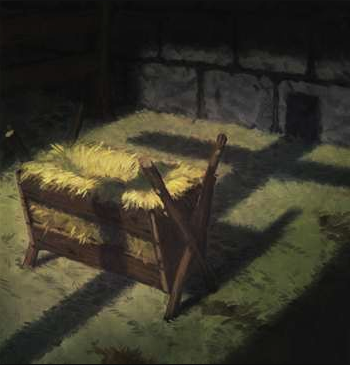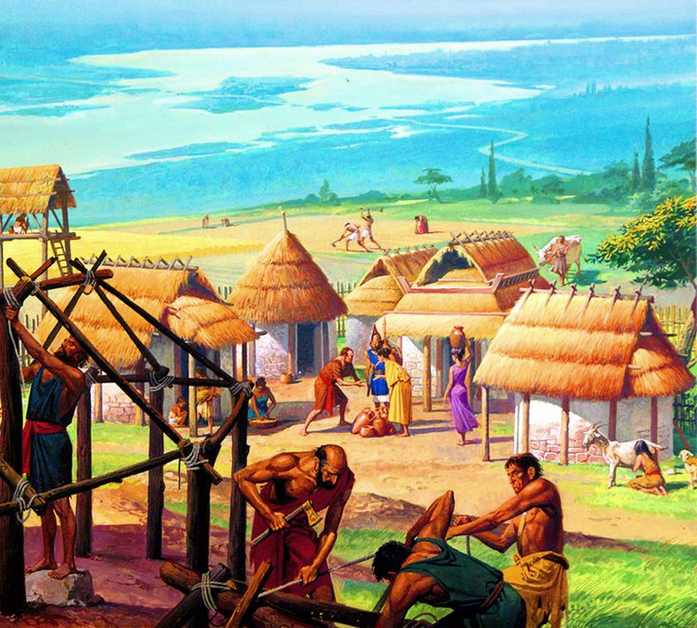Editor’s note: The following is extracted from The Life of Christ, by Giovanni Papini (published 1923).
The Stable
Jesus was born in a stable, a real stable, not the bright, airy portico which Christian painters have created for the Son of David, as if ashamed that their God should have lain down in poverty and dirt. And not the modern Christmas-eve “Holy Stable” either, made of plaster of Paris, with little candy-like statuettes, the Holy Stable, clean and prettily painted, with a neat, tidy manger, an ecstatic Ass, a contrite Ox, and Angels fluttering their wreaths on the roof – this is not the stable where Jesus was born.
A real stable is the house, the prison of the animals who work for man. The poor, old stable of Christ’s old, poor country is only four rough walls, a dirty pavement, a roof of beams and slate. It is dark, reeking. The only clean thing in it is the manger where the owner piles and hay and fodder.
Fresh in the clear morning, waving in the wind, sunny, lush, sweet-scented, the spring meadow was mown. The green grass, the long, slim blades were cut down by the scythe; and with the grass the beautiful flowers in full bloom – white, red, yellow, blue. They withered and dried and took on the one dull color of hay. Oxen dragged back to the barn the dead plunder of May and June. And now that grass has become dry hay and those flowers, still smelling sweet, are there in the Manger to feed the slaves of man. The animals take it slowly with their great black lips, and later the flowering fields, changed into moist dung, return to light on the litter which serves as bedding.
This is the real stable where Jesus was born. The filthiest place in the world was the first room of the only Pure Man ever born of woman. The Son of Man, who was to be devoured by wild beasts calling themselves men, had as His first cradle the manger where the animals chewed the cud of the miraculous flowers of Spring.
It was not by chance that Christ was born in a stable. What is the world but an immense stable where men produce filth and wallow in it? Do they not daily change the most beautiful, the purest, the most divine things into excrements? Then, stretching themselves at full length on the piles of manure, they say they are “enjoying life.” Upon this earthly pig-sty, where no decorations or perfumes can hide the odor of filth, Jesus appeared one night, born of a stainless Virgin armed only with innocence.
The Ox and the Ass
First to worship Jesus were animals, not men. Among men He sought out the simple-hearted: among the simple-hearted He sought out children. Simpler than children, and milder, the beasts of burden welcomed Him.
Though humble, though servants of beings weaker and fiercer than they, the ass and the ox had seen multitudes kneeling before them. Christ’s own people, the people of Jehovah, the chosen people whom Jehovah had freed from Egyptian slavery, when their leader left them alone to go up and talk with the Eternal, did they not force Aaron to make them a Golden Calf to worship? In Greece the ass was sacred to Ares, to Dionysius, to Hyperborean Apollo. Balaam’s ass, wiser than the prophet, saved him by speaking. Oxus, King of Persia, put an ass in the temple of Ptha, and had it worshiped. And Augustus, Christ’s temporal sovereign, had set up in the temple the brazen statue of an ass, to commemorate the good omen of his meeting on the eve of Actium an ass named “The Victorious.”
Up to that time the Kings of the earth and the populace craving material things had bowed before oxen and asses. But Jesus did not come into the world to reign over the earth, nor to love material things. He was to bring to an end the bowing down before beasts, the weakness of Aaron, the superstition of Augustus. The beasts of Jerusalem will murder Him, but in the meantime the beasts of Bethlehem warm Him with their breath. In later years, when Jesus went up to the city of death for the Feast of the Passover, He was mounted on an ass. But He was a greater prophet than Balaam, coming not to save the Jews alone but all men: and He did not turn back from His path, no, not though all the mules of Jerusalem brayed against Him.
The Shepherds
After the animals came those who care for animals. Even if the Angel had not announced the great birth, they would have gone to the stable to see the son of the stranger woman. Shepherds live almost always alone and far away. They know nothing of the distant world, nor of the feast-days of the earth. They are moved by whatever happens near to them, even if it is but a little thing.
But as they were watching their flocks in the long winter night, they were shaken by the light and by the words of the Angel. “Fear not, for I bring you good tidings of great joy….Glory to God in the highest and on earth peace to men of good will.” In the dim light of the stable they saw a beautiful young woman gazing silently at her son. And as they saw the baby with His eyes just open, His delicate rosy flesh, His mouth which had not yet eaten, their hearts softened. The birth of a new man, a soul just become incarnate taking upon itself to suffer with other souls, is always a miracle so deep as to move to pity even the simple-hearted who do not understand it. For the shepherds forewarned, this new-born child was not just a baby, but He for whom their suffering race had been waiting, for a thousand years.
The shepherds offered what little they had, that little which is so great when offered with love. They carried the white offerings of their craft, milk, cheese, wool, the lamb. Even today in our mountains, where one finds the last dying traces of hospitality and fraternal feeling, as soon as a wife is delivered of a child, the sisters, wives and daughters of the shepherds come hurrying to her; and not one of them empty-handed. One has three or four eggs still warm from the nest, another a cup of freshly drawn milk, another a little cheese, another a pullet to make broth for the new mother. A new being has begun his suffering: the neighbors hasten to carry their offerings almost as though to console the mother.
Themselves poor, the old-time shepherds did not look down on the poor. Simple as children, they loved children. They came of a race born of the Shepherd of Ur, saved by the Shepherd of Midian. Their first kings had been shepherds – Saul and David – shepherds of herds before being shepherds of tribes. But these shepherds of Bethlehem, “unknown to the hard world,” were not proud. A poor man was born among them and they looked on him with affection and lovingly brought him their poor riches. They knew that this boy, born of poor people in poverty, born of common people in the midst of common people, was to be the redeemer of the humble, of those men of good will, on whom the Angel had called down peace.
The Wise Men
Some days after this, three wise men came from Chaldea and knelt before Jesus. They came perhaps from Ecbatana, perhaps from the shores of the Caspian Sea. Mounted on their camels with their full-stuffed saddle-bags, they had forded the Tigris and the Euphrates, crossed the great desert of the nomad tribes, followed along the Dead Sea. They were guided to Judea by a new star like the comet which appears every so often in the sky to announce the birth of a prophet or the death of a Caesar. They had come to adore a King, and they found a nursing baby, poorly swaddled, hidden within a stable. Almost a thousand years before this, a Queen of the East had come on a pilgrimage to Judea, and she, too, had carried gifts, gold, fragrant perfumes and precious stones; but she had found on the throne the greatest king who had ever reigned in Jerusalem and from him had learned what no one else had been able to teach her.
The wise men found no king. They found a new-born baby, a tiny boy, who could neither ask nor answer questions, a boy who in His maturity was to disdain material treasures, and the learning which is based on material things.
They were not kings, these wise men, but in Media and Persia they were the masters of kings. The kings ruled over the people, but the wise men directed the kings. They alone could communicate with Alma Mazda, the good God. They alone knew the future, and Destiny. They killed with their own hands the enemies of men and of the harvests, snakes, harmful insects, birds of prey. They purified souls, they purified the fields. Except from their hands God accepted no sacrifices. No king began a war without consulting them. Theirs were the secrets of heaven and earth. In the name of science and religion they held first rank in the nation. In the midst of a people sunk in material things they represented the Spirit. It was fitting that they should come to kneel before Jesus. After the animals which are Nature, after the Shepherds which are the common people, this third power which is knowledge knelt at the manger in Bethlehem. The old priestly caste of the Orient made its act of submission before the new Lord, who was to send His Gospel to the west. The learned men knelt before Him who was to set above the learning of words and numbers, the new wisdom of love.
Symbolizing the old theology bowing before the final revelation, the wise men at Bethlehem knelt before Innocence: Wealth prostrated itself at the feet of Poverty.
They offered gold to Jesus: gold which He was to tread underfoot. They offered it not because Mary in her poverty might need it for the journey, but in anticipation of the command, “Sell all that thou hast and give it to the poor.” They offered Him frankincense, not to drown the stench of the stable, but as a token that their own ritual was ended; that their altars would need smoke and perfume no longer. They offered Him myrrh knowing that this boy would die young, and His mother, smiling now, would need spices to embalm the dead body.
Kneeling in their pontifical robes upon the bedding of straw, they, the mighty, the learned, the soothsayers, offered themselves as pledges of the obedience of the world….









